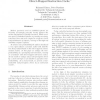Free Online Productivity Tools
i2Speak
i2Symbol
i2OCR
iTex2Img
iWeb2Print
iWeb2Shot
i2Type
iPdf2Split
iPdf2Merge
i2Bopomofo
i2Arabic
i2Style
i2Image
i2PDF
iLatex2Rtf
Sci2ools
122
click to vote
ISORC
2007
IEEE
2007
IEEE
Time-Predictable Task Preemption for Real-Time Systems with Direct-Mapped Instruction Cache
Modern processors used in embedded systems are becoming increasingly powerful, having features like caches and pipelines to speedup execution. While execution speed of embedded software is generally increasing, it becomes more and more complex to verify the correct temporal behavior of software, running on this high-end embedded computer systems. To achieve time-predictability the authors introduced a very rigid software execution model with distribution being realized based on the time-triggered communication model. In this paper we analyze the timepredictability of a preempting task-activation, running on a hardware with direct-mapped instruction caches. As one result we analyze why a task-preemption driven by a clock interrupt is not suitable to guarantee timepredictability. As a second result, we present a timepredictable task-preemption driven by an instruction counter.
Correct Temporal Behavior | Direct-mapped Instruction Caches | ISORC 2007 | Software Engineering | Software Execution Model |
| Added | 04 Jun 2010 |
| Updated | 04 Jun 2010 |
| Type | Conference |
| Year | 2007 |
| Where | ISORC |
| Authors | Raimund Kirner, Peter P. Puschner |
Comments (0)

